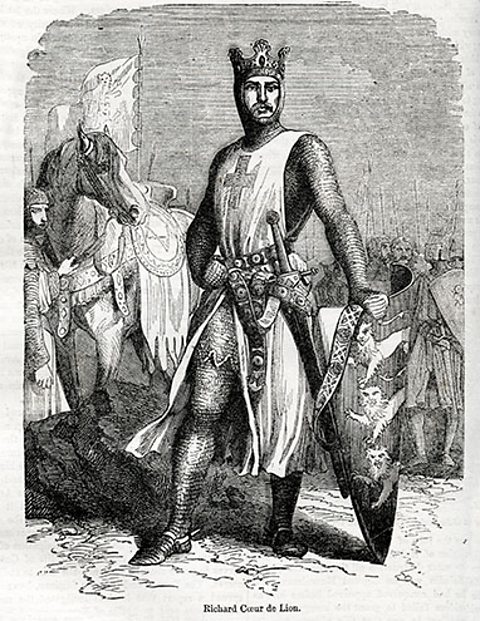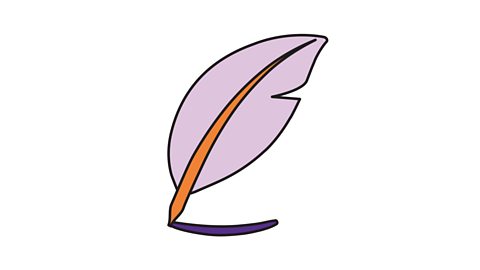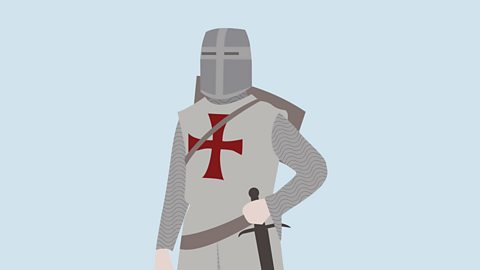Key points
- The CrusadesMilitary campaigns undertaken by Christians who believed that it was possible for them to 'reclaim' the Holy Land for Christianity from Islam. Muslims who lived in the Holy Land regarded the arrival of these Christian soldiers as an invasion. in the Holy LandPlaces around Israel and Palestine connected to the birth and life of Jesus. took place over a period lasting nearly 200 years.
- The consequences of the Crusades can still be felt in the world today.
- The Crusades had an impact on many areas including trade, finance, architecture and science.
The impact of the Crusades
Many historians see the end of the CrusadesMilitary campaigns undertaken by Christians who believed that it was possible for them to 'reclaim' the Holy Land for Christianity from Islam. Muslims who lived in the Holy Land regarded the arrival of these Christian soldiers as an invasion. as being in 1291, when the port city of Acre was retaken from Crusaders by Islamic armies. The Crusaders had failed to reclaim the Holy LandPlaces around Israel and Palestine connected to the birth and life of Jesus. as they had intended. The Crusades had been violent and bloody, causing the deaths of tens of thousands of people on both sides of the conflict.
Islamic armies had successfully defended the Holy Land from the Crusaders, and they went on to have military conquests of their own throughout the Middle Ages. In 1453, Islamic armies of the Ottoman EmpireThe Ottoman Empire was an empire that controlled large areas of southeastern Europe, western Asia and north Africa from the 1300s to the early 1900s. It was founded in the north-west of modern-day Turkey. captured Constantinople from the Christian Byzantine EmpireAn empire based on the remains of the Roman Empire, its capital was Constantinople (present day Istanbul) and the official religion was Christianity when it was founded in 330AD. Conquered by the Ottoman Empire in the 15th century.¬Ýand by 1529 had also conquered south-eastern Europe, including Hungary, and were besieging Vienna.
Many aspects of Western life have been impacted by the Crusades. Here are some examples:
| Warfare | The Crusaders learned more about warfare. Concentric castles - with two curtain (outer) walls - were developed during the crusades, and these ideas were used to improve and fortify castles back in Europe. Islamic armies had used gunpowder as an effective weapon when successfully retaking Acre from the Crusaders in 1291. |
| Medicine | Due to the number of injuries that doctors were treating, new medical discoveries were made. Hugh of Lucca served with the Italian army on a Crusade. He discovered that wine worked well as an antiseptic for cleaning wounds. |
| Exchange of ideas | There were times when Crusaders and Muslims showed mutual respect for each other and there is evidence that they shared ideas. Some Crusaders stayed in the Islamic states they travelled to, and this allowed an exchange of knowledge and ideas. Muslim scholars taught European scholars many things about science and medicine. |
| Literature | Many Arabic books, containing ideas about medicine, science and technology, were brought back to European countries and translated into Latin. This meant they could be read by, and educate, people in the west. |
| Trade | Trade increased, while Europeans also brought back knowledge about plants, irrigation and the breeding of animals. |
| New goods | Western Europeans brought back many goods, such as lemons, apricots, sugar, silk and cotton and spices used in cooking. |
How did Muslim scholars influence the European number system?
The number system used in Islamic countries, known as the Arabic number system, which uses the numbers 1, 2, 3, 4 etc and is based on place value, was more straightforward than Roman numerals I, II, III, IV etc. This number system made it easier to carry out calculations and is still in use today.
The use of zero, from the Arabic number system, enabled the early scientists of the Renaissance to develop the ideas of the Arabic and Ancient Greek astronomers. Complex mathematical calculations, such as determining the distance and positioning of stars and planets, were made more straightforward using Arabic numerals.
The role of military orders
During the CrusadesMilitary campaigns undertaken by Christians who believed that it was possible for them to 'reclaim' the Holy Land for Christianity from Islam. Muslims who lived in the Holy Land regarded the arrival of these Christian soldiers as an invasion., groups of knights were put together to protect pilgrims and defend the Holy LandPlaces around Israel and Palestine connected to the birth and life of Jesus.. When joining a military order, knights took a vow saying they would live in poverty, chastity and obedience to the Church.
The duties of a Crusader varied slightly according to their role or the Crusade they went on, but often included: fighting to try and win control of the Holy Land for ChristendomThe global Christian community., making a pilgrimageA holy, or, religious journey.¬Ý to holy sites associated with the life of Jesus, protecting Christian communities and pilgrimA person taking part in a pilgrimage - a holy or religious journey.¬Ý, and behaving in a chivalrousIn medieval times, to be someone who followed a code of behaviour set out for medieval knights - holding high standards in relation to moral values. ¬Ý way.
These were some of the main military orders involved in the Crusades:
The Knights Templar
- Founded in 1118, the Templar was based in Jerusalem.
- Templar knights were known for their bravery and military skills. However, non-military members made up about 90 per cent of the order.
- They managed financial affairs across many Christian countries.
- Their methods and systems are the basis of how banking works today.
- In modern culture, the Knights Templar have been included in many books and films.
The Knights Hospitaller
- Given Papal blessing in 1113 by Pope Paschal II, the Knights Hospitaller was created to look after sick or injured pilgrims to the Holy Land.
- The patron saintA saint who is believed to give special help to a particular place, activity, person, group or type of object.¬Ýof the order was St John, who Christians believe baptised Jesus Christ.
- It is the order on which St John Ambulance is based, which still provides care for people in Britain today.
Teutonic Knights
- The Teutonic Order was founded in 1190.
- The order supported pilgrims on their journey to the Holy Land
- It set up hospitals to treat sick and injured pilgrims and Crusaders.
Taxes and political problems in England

The CrusadesMilitary campaigns undertaken by Christians who believed that it was possible for them to 'reclaim' the Holy Land for Christianity from Islam. Muslims who lived in the Holy Land regarded the arrival of these Christian soldiers as an invasion. were expensive and led to higher taxes at home.
A form of tax called the ‘Saladin tithe’ was introduced in 1188 to pay for the efforts of Crusaders to reclaim Jerusalem. Also, in 1192, when travelling home from the Holy LandPlaces around Israel and Palestine connected to the birth and life of Jesus., Richard I was imprisoned and held for ransom by Leopold V of Austria and Henry VI, the Holy Roman Emperor - two Christian rulers. A tax was raised to collect the money required for his ransom.
In the time when Richard I was held captive, his brother John tried to take the throne from him. He was unsuccessful. The relationship between the two brothers eventually improved when Richard returned to England.

What were relations like between the two sides during the Crusades?
In 1187, Crusaders led by Richard I had captured around 3,000 Muslim prisoners. Negotiators couldn’t find agreement over the terms for their release between Saladin and Richard. Baha-Ed-Din, who was a Muslim scholar in the twelfth century, wrote in his biography of Saladin that the majority of the prisoners were publicly killed.
In 1191, Richard I and Saladin wrote to each other, attempting to negotiate a settlement. Saladin’s letter to Richard is useful in showing the importance of Jerusalem to Muslims and why they were so determined to defend it against Crusaders.
Though they were fighting over the Holy LandPlaces around Israel and Palestine connected to the birth and life of Jesus., there was a degree of mutual respect between Muslims and Christians. Saladin and Richard I wrote to each other in an attempt to reach a peaceful settlement over the Holy LandPlaces around Israel and Palestine connected to the birth and life of Jesus. following the third Crusade. Richard wrote to Saladin, explaining the importance of the Holy Land to Christians.
What did Richard say in his letter to Saladin?
‘The Muslims and the Franks are done for. The land is ruined, ruined utterly at the hands of both sides. Property and lives on both sides are destroyed … All we have to talk about is Jerusalem, the Holy Cross and these lands. Now Jerusalem is the centre of our worship which we shall never renounce [give up], even if there were only one of us left. The Holy Cross, that is a piece of wood that has no value for you, but is important for us. Let the sultan bestow [give] it upon [to] us. Then we can make peace and have rest from this constant hardship.’
- The Franks were people from a region covering present-day France, Belgium and Germany. The term is often used to describe the people who travelled from Western Europe to take part in the Crusades.
- Sultan is the title given to a ruler in some Muslim countries.

How did Saladin reply to Richard?
‘Jerusalem belongs to us just as much as to you, and is more precious in our eyes than in yours. It was the place of our Prophet's journey, and the place where the angels gathered. Therefore, do not imagine that we shall give the city up to you, or that you will convince us in the matter. As regards the land, it belonged originally to us, and you came to attack us; if you succeeded in taking it, it was only because you came unexpectedly and also because the Muslims there were weak; as long as the war lasts, God will not allow you to build anything in this country.’

Despite the conflict and bloodshed of the CrusadesMilitary campaigns undertaken by Christians who believed that it was possible for them to 'reclaim' the Holy Land for Christianity from Islam. Muslims who lived in the Holy Land regarded the arrival of these Christian soldiers as an invasion., there were times when the two sides shared ideas and worked together. For example, in 1187, the Treaty of Ramla was signed. This established a 10 year peace agreement and allowed the free movement of Christian and Muslim pilgrimA person taking part in a pilgrimage - a holy or religious journey.¬Ý to travel to and from Jerusalem.
Test your knowledge
Play the History Detectives game! gamePlay the History Detectives game!
Analyse and evaluate evidence to uncover some of history’s burning questions in this game.

More on The Crusades
Find out more by working through a topic
- count1 of 2
